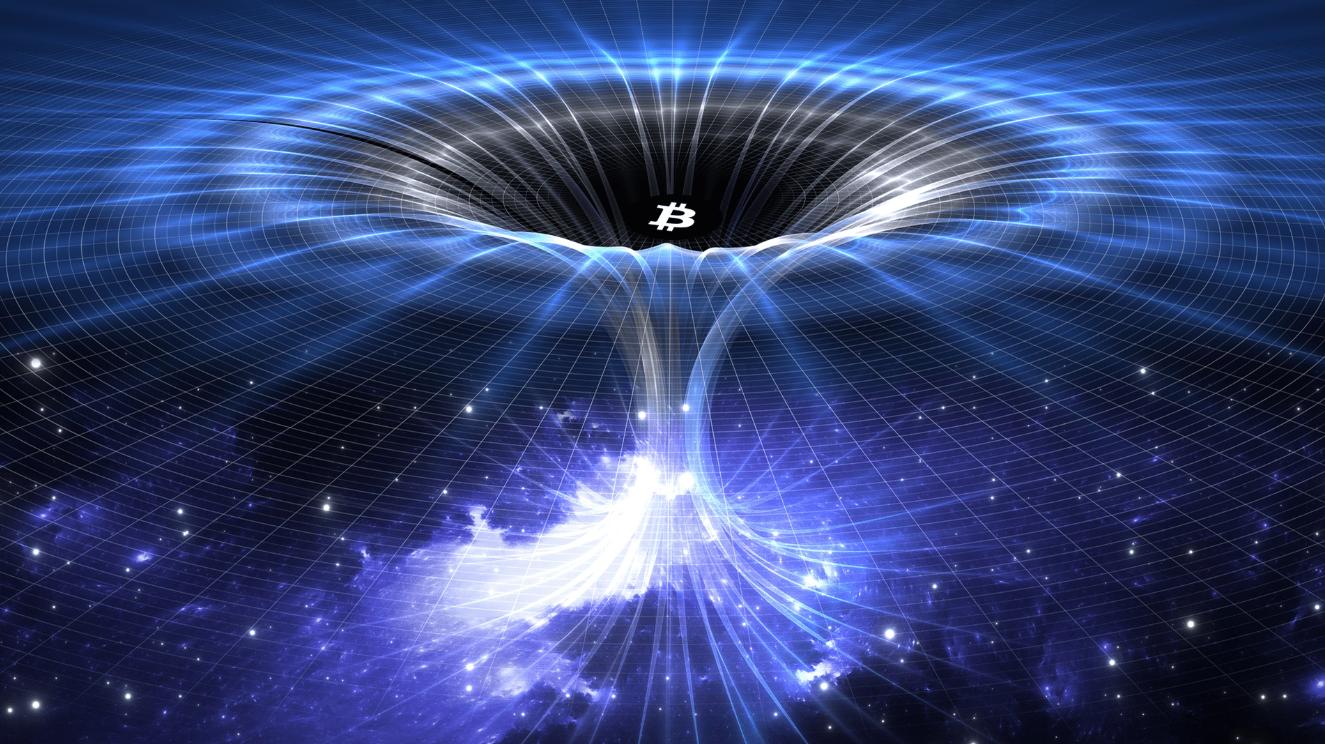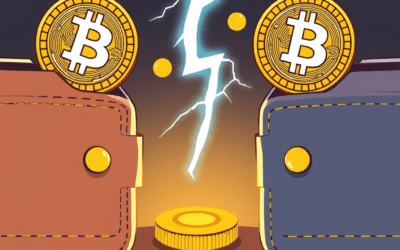By David W
The Bitcoin Blackhole analogy is a simple one to make. An analogy that can go viral quickly. Bitcoin is clearly accruing more and more financial capital and human attention over time. It’s adoption feels like an inevitability to most of us and the network is growing in both size and strength each year that passes. There’s no doubt that items priced in bitcoin have been getting cheaper since its inception.
It is a popular view for Bitcoiners to believe that it is performing like a singularity whereby all value in our current world will be represented by 21 million coins. Or 20,999,999.9769 to be exact.
The purpose of this article however is to consider whether it is the best analogy to make, comparing Bitcoin with a black hole, when another phenomena could better describe what we are witnessing with the network. More on that below.
2. Quotes about Black Holes ⚫
- Max Keiser: “Bitcoin black hole is sucking capital from every asset class; stocks, bonds, Gold, Silver, property, …everything.”
- *Michael Saylor : “Everything that comes into the orbit of the planetary body is getting sucked into the planet…and it’s getting stronger and stronger. Bitcoin is the one asset that as it’s price goes up, it is more attractive to investors.”
- Adam Back: “Bitcoin is like a hard money black hole, hard to escape the event horizon.”
- nvk: “like a black-hole, bitcoin will keep swallowing the worlds stored energy in balance sheets.”
- Robert Breedlove: “Bitcoin is the global economic singularity: the ultimate monetary center of gravity — an exponential devourer of liquid value in the world economy, the epitome of time, and the zero-point of money.”
- Bill Barhydt: “When a black hole consumes all light it doesn’t worry about which stars survive and which ones die. Bitcoin is the blackhole that will consume everything.”
- Luke Broyles: “The more energy you throw at BTC the black hole, the larger it grows.”
- Joe Burnett: “Bitcoin is a monetary black hole. One day the market cap of bitcoin will be worth multiples more than all real estate, equities, and bonds combined.”
- Root: “The monetary black hole: Bitcoin”
- BitcoinTina: “Bitcoin will be the financial Black hole it will destroy everything in the financial system”
- Trace Mayer: “Bitcoin can become like a black hole on the world’s balance sheet and suck in all this fiat and fractionally reserved banking money and really give us an equity-based monetary system on the other side.”
- Allen Farrington : “Bitcoin is a black hole sucking unsustainably artificial value beyond its event horizon. As it grows, so does its pull. Bitcoin is gravity.”
- Knut Svanholm: “Imagine, everything there is and everything that will ever be, divided by 21 million.”
- Strike: “Bitcoin is the black hole eating the entire legacy fiat system while creating a new financial paradigm on the other side”
Knut and the Strike team, in the above quotes, include the future beyond the black-hole when considering Bitcoin’s impact. However, we may wish to revisit this metaphor given that Bitcoin itself has properties that are very much dissimilar to black holes…
3. Black Holes Centralise Power ⚫
When thinking about this categorisation for physics, astronomy or cosmology, we might reach a different conclusion than the above. The singularity that a black hole creates at some point obtains a mass far too dense, too heavy and too tightly compacted that it will explode, either under it’s own density or if it were to run out of fuel. Despite having a VERY long shelf-life; black holes do die and when they do.. “a burst of fireworks will light up the universe, heralding the end of the era.”
Black holes are also by name and their very nature, extremely dark. Absent of hope, light and life. Nothing can escape. Not even light itself.
Some might say black holes just exist in the universe, and they are not bad nor good per se. Yet we must acknowledge that their victims are dragged into its centre unwillingly, not out of choice. The forces of gravity see to it that at a certain point, there is no escape from it’s grasp.
Black holes are therefore the ultimate example of a closed system. **Their characteristics sound more akin to our current financial system, at least from my perspective. We’ll discuss this in more detail in #8.
4. White Holes Distribute Power ⚪
Only in recent years have white holes been receiving attention from physicists and astronomers. Some describe a white hole as the reverse of a black hole. A white hole being the creation of a new system. One which some theorise and compare to “the big bang”, a subject which was discussed on SN with @kr earlier this week. Make sure to add your thoughts if you missed it!
A. Distribution
White holes are created from a singularity. An immaculate conception, that distributes and propels its matter outwards into the wider universe, covering more and more space incredibly quickly. Some theorise it’s origin emerges from the result of a black hole. More on that later.
B. Cannot Go Back In Time
With a white hole, you have an event horizon, where anything from inside crossing that horizon gets ejected into the universe. Imagine for a second we had a front-row seat inside both a black hole and a white hole. Unlike where in black holes you would not be able to escape, in white holes you could not go back in time or to a past state. The universe is different after exiting a white hole. Much like it is after exiting a rabbit hole 🐇.
C. Untouchable
White holes also cannot be penetrated from the outside. It would require more energy than exists in the universe to enter a white hole. It is therefore like an ‘anti-gravity’, endlessly growing and emitting energy and material to prevent alterations to its desired state or path. The more you attack it or choose to enter it, the more it repels you.
5. Bitcoin Also Distributes Power 🟠
Now let’s compare a few of those examples to Bitcoin…
A. Distribution
Bitcoin itself had an immaculate conception after being a reaction to the dark forces in the current system. It was nurtured into adolescence from a single computer at its onset. Today, it has become the largest pool of computer resources in the entire world. Nothing, not even AI will likely ever be able to supplant it. Yet the power of that initial computer has dissipated into irrelevance now, in comparison to the network’s own resources.
Bitcoin is also emitting wealth and potential worldwide for those that are part of its network and choose to adopt it. Much like these 3 graphs represent:
📊 Clockwork Partners spiralling price, portfolio allocation & hash cost.
B. Cannot Go Back In Time
After uncovering Bitcoin, we as Bitcoiners can’t go back to our world view of years prior. Having seen the light of a novel merit-based system. Bitcoin is also gaining mindshare and awakening people to libertarian ideals. For them, this is a new age. Not an end.
Not only that.. after each block that gets found on the network, we cannot regress to the previous block’s state. Not without securing the overwhelming share of the network’s miners and hashing resources. All the transactions are buried beneath the weight of the other blocks for eternity, so the past is immutable here too.
C. Untouchable
Hearing that white holes being impenetrable from the outside, sounds eerily similar to Bitcoin, does it not? As seen above in the red spiral, it is taking more and more energy to earn satoshis from the block reward each week that passes.
Bitcoin grows stronger from the fact that the more that people that seek to co-opt and control its hash rate, source code or development direction; the more participants will seek to defend it. There are exceptionally high physical costs in the real world for those that seek to do so. As we can see from the above red chart.
6. Are White Holes A Better Analogy? ⚪
If we know all the above, can we not already say that white holes are a better analogy for Bitcoin? Here are some adjectives to showcase the distinction between black and white holes. Each of which is described in more detail at the bottom of this article.
| ⚪ White Holes | ⚫ Black Holes |
|---|---|
| Beginning | Ending |
| Impenetrable | Inescapable |
| Expansion | Contraction |
| Growth | Decay |
| Transparent | Opaque |
| Abundance | Austerity |
| Mysterious | Observed |
| Instantaneous | Slow |
7. CBDCs Will Change Everything ⚫
Bitcoin has been attracting increasing amounts of capital from the current system over its entire lifetime. It is on a typical adoption S-curve in that respect. Capital is being allocated to this novel form of money, before we reach an ‘event horizon’ of sorts.
Spending Restrictions
As we all know, Central Bank Digital Currencies (CBDCs) will allow cowardly countries to restrict what you can spend your money on. When they choose to implement these limitations or not remains to be seen, but they are designed specifically to solve this problem. There is no other reason why these oppressive technologies would exist. CBDCs are to be the ultimate tool of austerity and therefore the “event horizon” for it as a metaphorical black hole. Once CBDCs are in place, there will be minimal or vastly-reduced capital flight. All financial energy would instead accrue to the centre at an even more alarming pace.
Separated Systems
There will likely come a time that there will be no direct bridge to Bitcoin, in certain jurisdictions in the world. No means to buy it like we are accustomed today. No longer a need to surveil the exit ramps if CBDC-fiat can be programmed for incompatibility.
Bitcoin Must Be Earned
To obtain Bitcoin in future you will need to be part of the very network, either by mining, contributing to development OR exchanging goods and services for Bitcoin. This scenario mirrors the characteristics of a white hole, by being unable to enter inside without being part of its expansion into the universe.
We should all be diversifying our income streams for this eventuality. If not, we should at least stop and consider the implications of this eventuality. No longer will you be able to exchange fiat for Bitcoin in a CBDC future.
Preventing Capital Flight
By design, CBDCs are a creation by this dark system to delay its own exponential decay. It is a predictable phenomenon and reaction if you acknowledge the system itself is no longer sustainable, that it demands more and more monetary energy accrue to its centre. What we are witnessing is a defence-mechanism to extend its lifespan by a few months further, albeit to the detriment of all other participants. As Preston Pysh likes to say, it’s a game of monopoly that people are increasingly unwilling and unable to play. (Even when it becomes free to continue playing). Our existing financial system is increasingly looking like a black hole of itself. Capital inside the current system may soon be inescapable from the forces of gravity imposed by central bankers. Every transaction traceable, taxable and worst of all reversible.
‘Dark Age’ for Bitcoin
In this scenario, Bitcoin may be unable to absorb the monetary value from individuals in the existing system that we expect that it will. The asset could even experience a ‘dark age’ for a decade. I’m not predicting that anytime soon, but CBDCs may see to it later this decade.
The asset would no longer function as a black hole under those circumstances, instead becoming incompatible with the existing system or what remains of it. As a network it would still thrive as a payments technology. Circular Bitcoin economies will become a necessity rather than a desire in such a scenario.
Bitcoin may not stop growing & accruing mindshare under these conditions either, but it would be a stretch to say it would attract increasing amounts of capital like we see today. There may even be a dramatic repricing under this scenario in fiat terms, given the amount of institutional investment that may need to exit. The very same institutions that are governed by the world’s financial system.
Artificial Scarcity
It could be argued that Bitcoin is accelerating the demise of the fiat system, yet this would be happening even if Bitcoin had not existed yet. Gold or real estate would be accruing all of that monetary premium, as it has in decades prior, in the absence of true scarce money. Today it is accruing to Bitcoin, which is unwinding or reducing the monetary premium those assets carry – but it could have been any other asset under the wing of big banks. It need not be Bitcoin, in spite of its ultra hard-cap. In the age of CBDCs we will likely see a resurgence of creative and artificial forms of scarcity, much like German farmers over-invested in farm machinery during the Weimar era.
8. Our Financial System ⚫
The existing financial system is looking more and more like it’s own black hole. Centralising power worldwide, bankrupting honest families, inflating-away wealth & causing all manner of distortions that are becoming more and more obvious by each week that passes. The existing system is contracting upon itself, just like the death of a star in our universe. Ruining everything else that comes within its path, not transforming or free’ing it.
Just look at wages, velocity & inflation in the United States – indicators of what could otherwise be a healthy economy. The average money a person takes home, the amount of times that money is turned-over and spent into the real economy and the cost of goods and services in the economy paint a bleak picture.
🇺🇸 Wage Compensation– link & Monetary Velocity – link
🇺🇸 Cumulative Inflation since 1913 – link
This last cumulative chart is quite something! It’s a cleaned-up version from the chart shown on InflationData. This means that something that cost $9.80 in January 1913 would cost $296.28 in July of 2022. What’s worse is that people think this is “normal”. Even if inflation has only been 3.24% compounded per year since 1913, it has been clearly accelerating in recent years and in particular since 1971. Just look at the new angle of attack we have witnessed in recent years.
As we can envisage, this system only resolves itself in 1 of 2 ways. Ever more extreme inflation, which many Bitcoiners believe will occur, or a crippling deflationary bust to come. Either way, the existing system is on-track to absorb and vacuum-up all monetary energy into its centre. Probably by 2040. That is without a BItcoin standard…
9. Bitcoin Standard ⚪
On the flip-side, stop and imagine an economy instead fully leveraging Bitcoin. Now approaching 2024, I have still yet to read Saifedean’s book, but here are my thoughts on what that might look like…
In such an economy, person to person payments would be many multiples of what they are currently today. Salaries would be paid by the second, taxes would be minimal and somewhat voluntary, plus revenue-splits would be commonplace. All transactions for all companies, charities, schools, IOT, commerce would be instantaneous. Suppliers, employees, creators, manufacturers, copyright holders & more would be paid instantly on each unit of spend. 90 day payment terms and end of the month salaries would be a laughable memory of the past. Under such conditions monetary velocity would be many multiples higher than it is today. A greater share of money would change hands times daily, in spite of being a superior savings technology.
The average business owner would be far more profitable, completely unencumbered by the bureaucracy, third party leeches and the inefficiencies of doing local business let alone cross-border commerce today. In a thriving Bitcoin economy; productivity would flourish given that investments would demand a significant return on investment from spending satoshis. R&D would see to it that companies only invest in ventures that move the needle and level-up society, rather than seeking a quick buck by running a split-test on a website button. People would be focused on longer-term ventures and as Tuur recently mentioned we would likely see a Bitcoin-baby-boom create larger families as a result. Economies would grow to be incredibly more valuable than we can even anticipate today, resulting from commercial freedoms and demographics. Individuals and small businesses would have access to the very best ‘talent’ from A.I, matching and out-competing the goliaths of Apple, Google, Amazon, Microsoft – given they would possess a fraction of the same overhead or regulatory burden overhanging from the prior decades and that individuals had accumulated Bitcoin in advance of them.
Much like the onset of the gold standard did for United States from 1792 to 1971. The world experienced steady growth during that 180 year period, in spite of countries temporarily abandoning it on occasions to fund their mindless civil and world wars. Some libertarians anticipate that the economy would likely be at least 50% larger had they not abandoned a hard money standard many decades ago.
So why then, would we choose the black hole analogy if it limits Bitcoin’s potential impact on the world to the current mass of our financial system today? If it is clearly a brighter and larger system for our future?
10. What else do we know about white holes? ⚪
It should be noted that not all scientists believe or acknowledge that white holes exist. Just like many mainstream economists don’t believe in the value of hard money and/or Bitcoin’s protocol at all. White holes have yet to be properly observed and so theories surrounding their existence differ somewhat. There was a sighting in 2006 for ‘GRB 060614’ which could have been a while hole but has yet to be categorised as so.
Below are the 3 main trains of thought for white holes. Included are extracts from people who spend their lives researching and thinking about these phenomena much more deeply than this cowboy author:
Theory 1. Black Holes & Big Bang
- “The geometry is very similar in the two cases (white holes and the Big Bang). Even to the point of being mathematically identical at times.” – “Hal Haggard, physicist
- “But if a black hole instead turns into a white hole then all the information is recovered,” –
Hal Haggard, physicist - “Once a black hole evaporated to a degree where it could not shrink any further because space-time could not be squeezed into anything smaller, the dying black hole would then rebound to form a white hole!” – “Carlo Rovelli, physicist
- “That means that minuscule black holes born in the infant universe could now be ready to pop off like firecrackers forming white holes” – “Carlo Rovelli, physicist
TLDR – What this all means is that as a black hole collapses under its own gravity, it continues to shrink until it cannot shrink anymore. At this point, it will exert a huge pressure that would then turn itself from a black hole into a white hole. All of the energy would convert from a slowly-growing black-hole into a fast, sharp & explosive white-hole. ‘Gradually Then Suddenly” comes to mind for this theory.
Theory 2. Multiverses / Wormholes
- “There is no escape from a black hole in classical theory. Quantum theory however enables energy and information to escape from a black hole, and would merge gravity with the other fundamental forces of nature.” – `Stephen Hawking, cosmologist
- “The local laws of physics and chemistry can differ from one pocket universe to another, which together would form a multiverse.” – `Stephen Hawking, cosmologist
- “It turns out that black holes are in fact good children, holding onto the memory of the stars that gave birth to them.” –
Xavier Calmet, University of Sussex - “A wormhole connects the interior of the black hole and the radiation outside, like a bridge” –
Kanato Goto, theoretical physicist - “The energy density and the curvature become so large that classical gravity is not a good description of what’s happening there (with white holes). A more complete model of gravity would negate the instability and allow for white holes” –
Stephen Hsu, Michigan State University - “Every black hole is actually a wormhole or an ‘Einstein-Rosen bridge’ to a new universe on the other side of the black hole’s event horizon. The matter and information that falls into a black hole and emerges from a white hole in the baby universe. –
Nikodem Poplawskiz, University of New Haven
TLDR – What Stephen Hawking and others have suspected is that the energy from a black hole may not be lost after all but instead transferred to another place via another dimension or universe – lending to the idea of a small number of multiverses. This would happen by a process that they describe as ‘Quantum Theory’. Opening the prospect to a wormhole scenario, where black holes in one universe lead to white holes in another.
Theory 3. Don't Exist
- “They’re not realistic” – Andrew Hamilton, University of Colorado
- “If the particle approached the event horizon, it would not be able to cross the event horizon, sending the energy of the system skyrocketing. Eventually, the particle would have so much energy that it would trigger the collapse of the white hole into a black hole, ending its existence.” – `Paul Sutter, astrophysicist
TLDR – They have never been observed in our universe. Nor do we have the laws of physics determined to conclude that they should exist. It is therefore by many deemed extremely unlikely.
After writing about white holes at some length, this is unsurprisingly not my favourite conclusion. Human knowledge is always limited or bound by prior discoveries & theories. It’s my hope and expectation we will fully understand white holes and the big bang in the coming years. And the parallels with Bitcoin will become obvious for us all to see.
11. Why Bitcoin Could Still Be A Black Hole ⚫
Using Clockwork’s charts once more, we can observe see that the prices of all assets are indeed getting cheaper versus Bitcoin as time passes. It may therefore be valid to compare the Bitcoin asset to a black hole. The costs of purchasing are spiralling into the centre, requiring fewer and fewer sats. There is no question that bitcoin is absorbing monetary value from the existing system (what we may describe as ‘matter’) and mindshare of developers and libertarians (‘light’).
The black hole analogy is intuitive and also well understood. Black holes have been observed for decades and so their very existence need no longer debated. Bitcoin too has been accruing value and security at a pace unrivalled for any population or technology in human history.
If Bitcoin is a black hole, we should acknowledge that it won’t live forever, but it will outlive us. Black holes eventually die, but they do outlive our own universe:
“The entire age of the universe is a fraction of the time it would take (for one to die). As far as we’re concerned it is eternity.” –
Priyamvada Natarajan: Yale University
Schlussfolgerung 🏁
There is no denying that assets priced in Bitcoin have been becoming cheaper each year that has passed. Scepticism is warranted as to whether that trend can continue in the era of CBDCs. Given they are not here yet, a connection still exists between both the dark decaying system and the new bright beginning. A ‘wormhole’ of sorts. For now at least, we can entertain the prospect of having both black and white holes as simultaneous analogies for our NGU technology. Bitcoin is accruing all value and bootstrapping a new system at the same time.
I lean towards the white hole in this write-up for it’s positive properties and it’s immaculate conception. White holes may be short, fast and explosive at onset but they bootstrap a new and expanding universe, unleashing matter and potential into freedom and abundant space. They are also misunderstood by almost everyone on the planet today, as no one knows how to value or measure them. This has parallels to our comprehension of the future Bitcoin economy. We cannot even imagine its full potential for humanity, given our views are skewed by the current system today. And yet, there is still the vast majority of people that have yet to acknowledge its very existence.
As mentioned previously, the characteristics that a white hole has are much more favourable than it’s opposite; a black hole. The direct comparisons can be found below to help you make up your own mind on which you prefer.
White hole, black hole or both. I’ll let you Stackers decide!
P.S. Remember this write-up when you see your favourite Bitcoiner using the ‘black hole’ analogy on Twitter / Nostr. I’ll no doubt be thinking of the brighter side.
Appendix – White vs Black Holes
⚪ Beginning vs Ending ⚫
A black hole is the end state of any system. Anything in its path will be engulfed and reduced to an unimaginably small blob. It is where matter goes to die. A white hole on the other hand is a new beginning. Anything involved with its formation is thrust quickly into expansion, unleashed into space.
⚪ Impenetrable vs Inescapable ⚫
Once inside a black hole, you can pass inwards, but not outwards. Once you cross that event horizon, you are captured, you cannot escape and therefore your fate is sealed. Just as nothing can escape a black hole, nothing can enter a white hole. Passing the event horizon of a white hole means you are set free, with no one from the outside able to intervene and without being able to return.
⚪ Expansion vs Contraction ⚫
Black holes are centralising forces, contracting and reducing the size of all matter that enters them. They crave more and more energy to feed on to increase their size. White holes after formation, expand and allow matter to grow and form new systems at the expense of its own size. Becoming more distributed with their energy concentration over time.
⚪ Growth vs Decay ⚫
White holes expel energy and explode quickly into something new. Freeing itself of influence and unleashing its contents to grow into near-infinite space. Black holes destroy and crush its contents into a singularity, encouraging the death and destruction of what enters it slowly over time.
⚪ Transparent vs Opaque ⚫
White holes emit bright light. In spite of being short in duration, white holes cause a bright flash on explosion and speedily unwind in the reverse of a black hole formation. Black holes are dark and opaque. Being only visible because of light reflecting off the matter being pulled into its area of influence.
⚪ Abundance vs ⚫ Austerity
Black holes are limiting in both space and behaviour. They control the slow and arduous path of destruction for their victims. White holes project and provide increasing amounts of space for its victims over time. Put another way, white holes might also be a form of freedom technology.
⚪ Mysterious vs ⚫ Observed
White holes are misunderstood, and under-studied just like Bitcoin. Black holes however have been common knowledge for at least 50 years after the theory caught-up. There are now increasing amounts of sightings of black holes – so they are easily understood, by experts and plebs alike.
⚪ Instantaneous vs ⚫ Slow
Black holes are slow and exist for a long time, white holes are explosive and instant in formation. White holes are observable over a much smaller time period, which may be one of the contributing factors why we as humans have yet to observe one definitively.
More Links on White Holes 🔗
- Nautilus – White Holes Could Exist…
- Interesting Engineering – White Holes The Mysterious Twin
- Medium – Did We Detect a White Hole?
- MIT – Why Space Isn’t Filled with White Holes
- PBS – Are White Holes Real?
- Popular Mechanics – Hawking Paradox
- Colorado Ed – White Holes and Wormholes
If you enjoyed this one, please follow me on Nostr:npub1xfp0eu86raryz2sw53f9qnxdujm8z73c5s55d3vzkae06gz5p0dsxae7an









